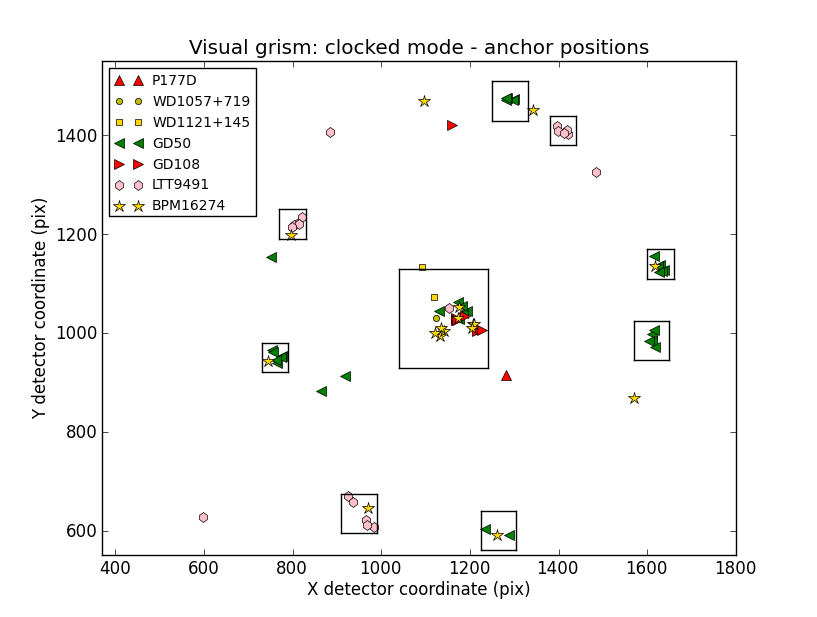Verification of the flux calibration in the visual grism: clocked mode¶
Overview¶
The new v-grism flux calibration is valid over the whole
detector, and makes also a correction for coincidence-loss.
The first integrated software version is UVOTPY-0.9.7.3.
With the choice of data, we have an independent set from the spectra used to construct the effective area. Of course, spectra from the same targets are used.
Method¶
Calibration spectra that were not used in the flux calibration are reprocessed using the new flux calibration and then compared to the known stellar flux. The spectra for verification are located on the detector between the areas with the spectra used to determine the effective areas for the flux calibration.
Data used for verification¶
The approximate location of the anchor of the spectra, their
obsid, and number of the fits extension is listed.
First the cool stars are listed, followed by the hot white dwarfs.
GSPC P177D spectra (F0 V)
| anchor | obsid |
ext |
% err | plot | aspect correction |
|---|---|---|---|---|---|
| 1281, 914 | 00056760001 | 1 | 10 | GSPC-P177D Figure 31 | yes |
BPM16274 spectra (DA White Dwarf)
| anchor | obsid |
ext |
% err | plot | aspect correction |
|---|---|---|---|---|---|
| 1095,1470 | 00054003006 | 1 | 10 | BPM16274 Figure 1 | None |
| 1570, 869 | 00054004004 | 1 | 15 | BPM16274 Figure 2 | None |
LTT9491 spectra (DB3 White Dwarf)
| anchor | obsid |
ext |
% err | plot | aspect correction |
|---|---|---|---|---|---|
| 597, 628 | 00056202005 | 1 | 50 | LTT9491 Figure 1 | yes |
| 885,1408 | 00056201003 | 1 | 25 | LTT9491 Figure 2 | yes |
| 1485,1326 | 00056202003 | 1 | 20 | LTT9491 Figure 3 | yes |
GD50 spectra (DA2 white Dwarf)
| anchor | obsid |
ext |
% err | plot | aspect correction |
|---|---|---|---|---|---|
| 562, 665 | 00054300019 | 1,2 | 18 | GD50 Figure 1 | None |
| 750,1150 | 00054303003 | 1 | 15 | GD50 Figure 2 | yes |
GD108 spectra (sdB)
| anchor | obsid |
ext |
% err | plot | aspect correction |
|---|---|---|---|---|---|
| 1150,1400 | 00055051008 | 1 | 10 | GD108 Figure 1 | yes |
Result of the verification¶
The errors are typically 20% or less. The response below 2900A shows some inconsistencies which is partly due to the low sensitivity, partly to the coincidence-loss correction. One spectrum of LTT9491 is located with anchor at [597,628], far from the calibrated region and the effective area has been extrapolated. A future update to the calibration based on extra coverage of the detector region where the response drops off steeply is needed to refine this. All other spectra are located in the calibrated region.



